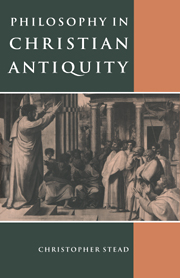19 - Freedom and goodness
Published online by Cambridge University Press: 29 September 2009
Summary
Augustine's three books On Free Will have a controversial purpose and are mainly aimed against Manichaeism; his central concern is the problem of evil, which the Manichees regarded as a cosmic principle comparable in power with God himself. Augustine has two distinguishable forms of reply, neither of them wholly original, but both developed with persuasive skill. In the first, he claims that our main concern is with moral evil. Like other thinkers, Augustine distinguishes two forms of evil, sin and suffering; but suffering, he claims, is the just punishment for the sin which man has committed at and after the Fall. Was it right, then, for God to create a world in which men could sin? Augustine answers that sin is a misuse of free will, and without free will there can be no virtuous conduct; God did right, therefore, in creating man free. Embedded in this argument is the claim that sin consists in the choice of lesser goods when greater ones should have been preferred; in particular, of course, bodily pleasures rather than spiritual benefits (op. cit. 2.48–54). Evil of this kind can arise in a world which is wholly good, as befits God's creation; no blame attaches to God for creating a world where there are different degrees of goodness; indeed such variety enhances its perfection as a whole. It is men who are to blame for choosing the lesser goods (3.5.12–3.6.18; cf. Civ. Dei 11.16–18, 12.4–5, etc.).
- Type
- Chapter
- Information
- Philosophy in Christian Antiquity , pp. 230 - 244Publisher: Cambridge University PressPrint publication year: 1994



